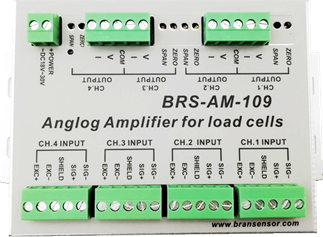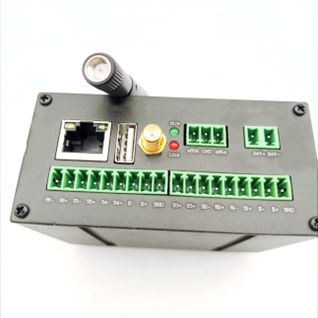 Force Sensor
Force Sensor
 Load Cell
Load Cell
 Torque Force Sensor
Torque Force Sensor
 Multi-axis Force Sensor
Multi-axis Force Sensor
 Piezoelectric Force Sensor
Piezoelectric Force Sensor
A load cell amplifier is a device that can increase the strength of signals coming from a load cell. Sometimes, the signals produced by the load cell can be feeble and low strength signals may not work with certain components of the measuring system like a data logger for load cells or load meter. The load cell amplifier resolves this issue by taking the signal and then amplifying it, resulting in a higher strength output signal.
Load cell amplifiers can work as a standalone device or it is present in most signal-conditioning modules.

The signals produced by a load cell will be mostly in mV (millivolt). A load cell amplifier coverts the mV signal into more powerful signals like 4-20 mA, 0-10 VDC, ±10 VDC, RS232, RS485, and USB. A load cell amplifier will need additional power.
One notable aspect here is that amplifying the signal does not cause the core data to change. In other words, it does not create any inaccuracies in the measured value.
The process of converting or making changes to the signal is called signal conditioning. There are a variety of other signal conditional methods like filtering, linearization, and more besides to amplification.
These types of hardware augments are selected based on the requirements of the project.
To produce an output signal, load cells need an excitation voltage. The maximum and recommended excitation values are often provided by the manufacturer, and it is important to maintain these values for the best output results.
Higher excitation voltage will indeed produce a higher output voltage. These larger signals are also easy to measure and digitize. But higher voltages will also lead to more current flow within the resistive strain gauges and eventually heat the load cell in the process.
When the voltage exceeds the maximum rated value, the excessive heat generated can lead to gauge failures. Also, higher excitation voltage will deplete the battery faster in the case of battery-operated devices.
A load cell amplifier with a built-in regulated excitation source is thus necessary to ensure that the output voltage of the strain gauge is proportional to the excitation voltage. This will ensure that the final output voltage produced by the load cells is accurate and free from noise and fluctuations.
These types of amplifiers provide a stable temperature compensated 10V reference voltage source for the excitation of load cells and ensure accurate measurement for the long term.
The output voltage of a load will be in the range of millivolts. For other devices connected to the load cell, reading inputs in the range of millivolts can be quite difficult. A load cell amplifier helps to condition the signal from the load cell and makes it legible for other devices. Load cell calibration depends on the load cell that is being used. In most cases, the manufacturer will do it for you if you order a load cell with an amplifier.
